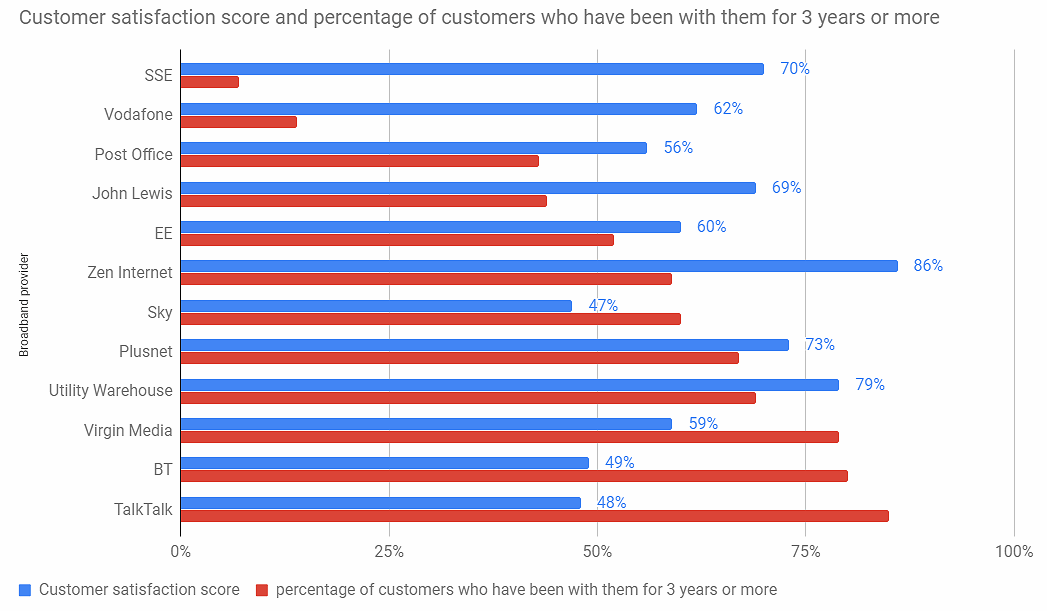Which? Name Top Rated UK Broadband ISPs and Slam Cost of Loyalty UPDATE
A new survey by consumer magazine Which? has named the best and worst rated 12 home broadband ISPs for customer satisfaction, which saw Zen Internet (86%) come top and Sky Broadband (47%) fall to the bottom. But the survey also warned that many people are paying over the odds by choosing to remain loyal.
According to Which?‘s survey of over 7,000 broadband customers, almost three quarters (71%) of respondents have been with their ISP for “at least” 3 years. Typically most of the discounts that big ISPs tend to offer only last for between 12 to 24 months (i.e. designed to match the minimum contract term) and once you get out of that period then the prices can shoot up.
For example, customers of Virgin Media faced the “biggest price rises” of the 12 providers. Overall the ISP achieved a satisfaction rating of just 59% and yet 79% of their customers still stuck with the provider for 3 years or more (perhaps because in many areas nobody else can beat their ultrafast speeds). But when moved on to a standard tariff, Virgin’s users were also found to pay 52% more on average than new customers.
Advertisement
Virgin’s biggest increase occurred after the first 12 months on their VIVID 100 (108Mbps average speed) package, with the price rising 74% from £27 to £47 a month. In fairness, these offers do vary through the year and so it’s likely that a different ISP may occupy this position as discounts change. But Virgin are by no means alone.

Much of the problem being highlighted above stems from the culture of discounting, which is a natural product of any aggressively competitive market, and how those are then promoted or perceived by consumers. In our view such discounts shouldn’t be a concern, so long as the ISPs make their post-contract prices completely clear; ideally right alongside the discounts (some ISPs do this but others don’t).
A few ISPs, such as TalkTalk, offer an alternative approach by enabling existing customers to re-contract on to a lower price point than their standard rate. Alternatively it’s also possible that a bit of haggling could save you a lot of money (see our ‘Retentions Tips‘ article ) but only about 10% of consumers do this.
Advertisement
Greg Mesch, CEO at CityFibre, said:
“It’s unacceptable that so many broadband customers get such a raw deal, paying over the odds for poor connections and being put off from switching by too-good-to-be-true offers that tie them in but don’t improve their speed.
Consumers will soon have a much greater choice over the services they buy as full fibre becomes widely available. Current advertising rules that allow copper-reliant connections to masquerade as fibre must be changed now to stop this situation getting worse.”
We note that many small ISPs don’t bother with discounts and instead adopt a standard price that doesn’t change, which is more honest but overall they can still be a little more expensive. On the other hand smaller ISPs may also deliver more advanced features (e.g. Static IP addresses) and better support or service quality, so it’s not all about price.
The Best Rated ISPs for H2 2018
Overall Zen once again managed to top the table for customer satisfaction, followed by Utility Warehouse and Plusnet. By comparison three of the markets biggest ISPs could be found flopping around at the bottom.
Sadly the survey’s sample size was far too small to cover the entire market and so we only get a partial reflection (i.e. take the outcome with a pinch of salt).
Top UK ISPs by Customer Satisfaction
1. Zen Internet 86%
2. Utility Warehouse 79%
3. Plusnet 73%
4. SSE 70%
5. John Lewis 69%
6. Vodafone 62%
7. EE 60%
8. Virgin Media 59%
9. Post Office 56%
10. BT 49%
11. TalkTalk 48%
12. Sky Broadband 47%
As you might expect many of the most highly rated providers also showed signs of strong customer loyalty, which is illustrated below.
Advertisement

It’s worth pointing out that Ofcom recently proposed new rules, which will require broadband ISPs to inform customers when they approach the end of their minimum contract term (here). Sadly this won’t be introduced until later in 2019.
On top of that the UK Government’s Competition and Markets Authority (CMA) has opened a “super-complaint” to examine how consumers who remain loyal to their provider can end up paying “significantly more” than new customers (here), but we don’t yet know what the outcome of that will be.
Mind you some may note that Which?’s own consumer magazine appears to have a very similar model to what is being criticised above. After a 1 month trial at £1 the monthly price of the magazine increases to £10.75 automatically, unless Which? is notified (that’s a 975% increase – totalling an extra £117 a year). Of course broadband providers do often have longer contract terms but people in glass houses..
UPDATE 11th Nov 2018
Added a comment from Virgin Media.
A Virgin Media Spokesperson said:
“With our latest V6 TV box, faster speeds and new programming we continue to invest to give our loyal customers more – all while usage on our network grows.
We make the price and length of a contract clear to customers when they sign up and the end date of any discount is contained within a customer’s monthly bill.
Ofcom is already consulting on end-of-contract notifications and we’re engaging with them to ensure we’re doing all we can to keep giving our loyal customers a top-class service.”
Mark is a professional technology writer, IT consultant and computer engineer from Dorset (England), he also founded ISPreview in 1999 and enjoys analysing the latest telecoms and broadband developments. Find me on X (Twitter), Mastodon, Facebook, BlueSky, Threads.net and Linkedin.
« BT Group Moots £200 Million Sale of UK Fleet Division
















































Comments are closed